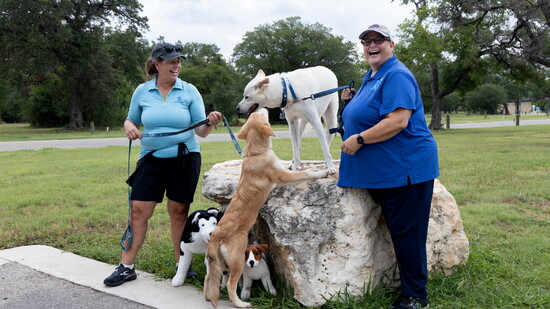With force-free, fear-free dog training rooted in modern behavioral science, See Spot Behave gives dogs a safe space to be curious, explore, and make mistakes. Their behavior consultants bridge the gap between overwhelmed owners and veterinarians, creating clear, compassionate plans forward.
Owner Diane Smith was inspired to become a trainer because of her first dog and mayhem specialist, Harley—a Husky/Chow mix who once renovated the kitchen by tearing off countertop tiles. Certified Canine Behavior Consultant Devi Puckett found her calling thanks to Zoe, an emaciated but scrappy Carolina dog dumped on the road who changed her life forever.
Today, through See Spot Behave, they help clients realize their dogs aren’t being bad—they’re just communicating their struggle, and it’s our job to listen.
“I know I’m in the right place when I pull up and hear a dog losing their mind behind the front door. Then it opens, and the owner is grabbing their dog’s collar, breathlessly apologizing, while their dog is barking, jumping, and spinning. I just smile and say, ‘Perfect. This is where we begin,’” says Smith. “If their dog snatches a sandwich off the counter mid-session, we’re not calling it a failure—we’re calling it a teachable moment. And maybe a funny story.”
“You don’t have to have the answers. You don’t have to justify why things feel so hard,” says Puckett. “That’s why I’m here. I want to hear your story, the good and the hard, what keeps you up at night, and what you wish your dog could understand. I’m not here to judge you—I’m here to help untangle the chaos and make it make sense.”
They’ve worked with anxious pups afraid to be alone, watchdogs convinced the mail carrier is a menace, and trash can connoisseurs with a flair for interior design. In any case, See Spot Behave shows owners that they’re being brave by embracing the magic of going slow rather than rushing change.
“Your dog isn’t giving you a hard time—they’re having a hard time,” says Puckett. “That shift from blame to empathy changes how you show up for your dog. And it changes how your dog responds, too.”
“Dogs are dogs,” says Smith. “Let’s stop expecting them to act like little people, and start meeting them where they are, with humor, snacks, and maybe a few less throw pillows.”
Get started at: seespotbehave.com
“We turn ‘What do I do with this dog?’ into ‘Look what we did today.’”
